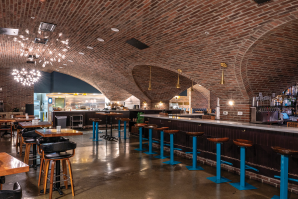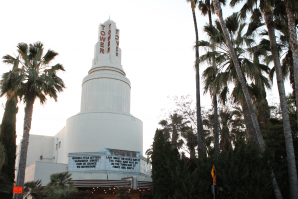Small ripples of laughter can be heard at Bob Hope Theatre in Stockton as on screen, young Kevin McCallister makes a pizza delivery driver flee in terror from his Chicago-area home.
It is Dec. 15 and the theater, which opened in 1930 as the Fox California, is showing a Sunday matinee of the 1990 holiday classic, “Home Alone.” Families and other attendees are scattered through the two-tier theater, which seats just shy of 2,200. Out in the lobby are volunteers for the non-profit Friends of the Fox, which helped spearhead a renovation of the historic theater approximately 25 years ago.
Many decades in the past, there were dozens of theaters across the United States affiliated with Fox Film Corporation (also known as Fox Studios), in an era when moviemakers set up their own chains of theaters and sometimes commissioned grand film palaces. Some of the old historic theaters, like the Fox Senator Theatre that once stood at 912 K St. in Sacramento, have long since been demolished or become other types of venues. Others like the Bob Hope Theatre, though, have shown what can happen after a successful push for preservation.
A view from the second level of Bob Hope Theatre.

Saving a jewel
Gloria Nomura, who served two terms on Stockton City Council from 1997 to 2004 and is now 83, still remembers going to the Fox in Stockton as a girl.
“That was the theater to go to,” Nomura says. “As a child and even as an adult, I was always impressed with how grander the Fox theater was, especially the lobby. I mean, it was like, ‘Wow, this is a movie theater.’”
A 2005 book, “Stockton’s Crown Jewel” authored by Friends of the Fox just after a successful $8.5 million renovation of the theater had been completed, includes many photos of the old days when the theater could be packed. Popular events included Bank Nights in the 1930s, when people could win cash drawings of as much as $1,000 — around a year’s earnings for the average person during the Great Depression.
A tapestry inside Bob Hope Theatre has been restored.

Design-wise, the theater looked magnificent from early on. There was a staircase leading to a mezzanine on the second floor, a koi pond in the lobby and large columns with intricate designs. Asked what he loves about the theater, Tim Cook, a 77-year-old board member for Friends of the Fox replies, “No. 1, it was built by craftsmen. Like everything you look at in here, like I tell them when I go on a tour, look at all these beams and all this and all that. That was all cement. And then people came in with plaster and knives and did that. Then they came in with three brushes to paint it.”
This level of craftsmanship, still quite evident at the theater, was on par with other film palaces built in the era. The Fox Theatre in Oakland has become a popular music venue and sometimes draws adoring comments on-stage by the musicians who come through town. In Sacramento, the Spanish-inspired Alhambra Theatre once stood as one of the finest theaters on the West Coast. Its 1973 demolition to build a Safeway is still lamented today.
Vast declines over the years in attendance for even the grandest of film palaces likely helped spell their doom. With the Fox California in Stockton, Nomura says the city eventually faced a decision about doing something with the old theater that was cost-efficient. Beyond this, the theater’s downtown location might have helped make it a candidate for demolition, with Stockton City Council voting 6-3 in the late 1970s to condemn the building to help make way for a 75-space public parking lot, according to the book “Stockton’s Crown Jewel.”
“Downtown doesn’t always have a lot of parking, and we have a couple of key government agencies,” Nomura says. “So parking is a premium.”
The theater was placed on the National Register of Historic Places in 1979, which helped avert demolition, though it languished for another two decades before closing for major renovations. These renovations were funded in part by longtime developer and San Diego Chargers owner Alex Spanos, with the theater renamed in honor of his friend and legendary actor Bob Hope after it reopened.
Keeping theaters going
The unsung heroes of live events are production staff, people like Jordan Alcoriza, who is production manager for the Bob Hope Theatre through ASM Global and quietly made sure that “Home Alone” ran smoothly.
Jordan Alcoriza is production coordinator at the Bob Hope Theatre
for ASM Global.

“I really enjoy this beautiful old theater, and I really work hard to be a good steward of the building and maintain its condition and do what I can to address issues as they come up, which is challenging because it’s a city-owned, historic venue,” Alcoriza says.
And issues, they do come up. Take the State Theatre in Auburn. Opened in December 1930, the theater was divided into office, retail and a smaller, 500-seat theater space after a girder supporting its balcony failed in the early 1970s, according to the theater’s website (Executive Director Colleen Sands didn’t respond to a request for comment).
State Theatre in Auburn opened in December 1930.

In more recent years, the theater has gone through various iterations with different names and is currently a 350-seat venue for both performing arts and screenings of classic films. A sign currently at the door of the theater notes its temporary closure. The theater has film or stage productions booked through mid-March at the Odd Fellows Lodge at 1226 ½ Lincoln Way in Auburn, just down the street.
For the Bob Hope Theatre, the challenges it faces aren’t just technical. It can also be tough to attract sufficient crowds. Cook, who is a Vietnam War-era veteran, says he attempted to organize a showing for veterans in November of “PT-109,” a 1963 film that commemorates future President John F. Kennedy’s actions piloting a doomed torpedo boat during World War II. But because of a major event in Reno on the same day in honor of the United States Marine Corps’ 249th birthday, just 59 veterans showed up to the “PT-109” showing in Stockton.
“Most people that live in Stockton have never seen this theater,” says Steve Colangelo, a local radio personality who served as a volunteer emcee for a raffle before “Home Alone.”
In general, historic theaters can face a difficult calculus to keep the lights on. Roseville Theatre Arts Academy, which operates out of the former New Roseville theatre that opened in 1926, relies in part on children coming through on field trips. Megan Hoyt, who is executive director of the theater, notes that other operators have used the space, such as Magic Circle Theater, which went bankrupt in 2010. She considers her organization lucky to have a facility with such history, a place where children can learn or perform where vaudeville actors once did likewise.
Roseville Theatre Arts Academy operates out of the former New
Roseville theatre that opened in 1926.

“History should be saved,” Hoyt says. “History should still be here for everybody.”
Since the Bob Hope Theatre’s reopening, notable comedians like Jerry Seinfeld and Bill Burr have come through town. Erik Taylor, a Stockton resident who attended the “Home Alone” showing with his wife Daniella and sons Wyatt and Warren, says he’s seen the band Switchfoot perform at the theater. Others like Friends of the Fox board member Dee Dee Schwerin have enjoyed going to movies at the theater over the years, though it’s the theater’s history and aesthetic appeal that draws her in.
“It’s beautiful just to look at,” Schwerin says. “And I like hearing the ghost stories.”
Minnie Eichele, board member for Friends of the Fox, stands in
the lobby area of Bob Hope Theatre.

Friends of the Fox board member Minnie Eichele, 79, wasn’t allowed by her mom to go to movie theaters when she was growing up in the Stockton area. In more recent years, she went to movies at the Bob Hope Theatre with her late husband.
“I love that it’s still here,” Eichele says. “We’ve lost so many things, historic buildings and things that meant a lot.”
–
Subscribe to the Comstock’s newsletter today.
Recommended For You

Theater Food: Not Just a Stage
Capital Region theaters offer more than popcorn
Crest Theatre (formerly Empress Theatre) and Empress Tavern, which have been open since 1912 and 2015, respectively, is just one theater-restaurant pairing where you can have a full night out in Sacramento. From downtown Sacramento to Oak Park, legacy theaters around the region are serving up both dinner and a show.

The Value of Art
4 years out of the pandemic, Sacramento’s arts scene brings in tourism and tax dollars
A 2022 study conducted by Americans for the Arts in partnership with Sacramento Alliance for Regional Arts found that nonprofit arts- and culture-related activities in Sacramento County injected over $241 million into the local economy.

Film Festivals Take Center Stage in Sacramento
These festivals bring both culture and economic benefits
The general image that comes to mind for most people when describing a film festival are grand events like the Sundance festival in Utah or the Cannes in France, but Sacramento has more than a handful of its own staple events.

That’s Show Business
The complex economy behind the Capital Region’s thriving local theater scene
COVID-19 exposed the stark realities of the precarious economic state of the theater industry, but even regular theatergoers may not look past the glamour and drama of live theater to the grit, sweat and dollars that go into it.



